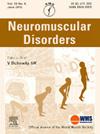167p对4-7岁杜氏肌营养不良症患儿的照顾者进行定性访谈,评估代理填写的DMD-QOL的内容效度
IF 2.8
4区 医学
Q2 CLINICAL NEUROLOGY
引用次数: 0
摘要
杜氏肌营养不良症生活质量(DMD- qol)是一份包含14个项目的问卷,旨在评估男性杜氏肌营养不良症(DMD)患者的身体功能、心理影响和社会参与,该问卷已通过代理报告和自我报告在7岁以上男孩和10岁以上男孩中得到验证。目前,在年轻DMD患者中使用代理完成的DMD- qol存在证据缺口。我们对英国和美国7岁以下DMD患儿的照顾者进行了定性概念启发/认知访谈。访谈探讨了患者对DMD的体验,并评估了代理完成的DMD- qol的相关性、全面性、易用性和可理解性。对英国(n=3)和美国(n=4) 5-7岁DMD患儿的7名照顾者(均为父母)进行访谈;DMD诊断时的平均年龄为3.4岁(范围:0-5.3岁)。所有护理人员(n=7/7)报告说,DMD-QoL说明是可以理解的,回忆期是明确的,他们能够回答每个项目提供的回答选项。与这个年龄段相关的常见概念包括行动困难(n=7/7)、感觉疲倦(n=6/7)、疼痛(n=6/7)和感觉不快乐(n=6/7)。较少的护理人员赞同心理影响概念的相关性(例如,他感到尴尬[n=3/7],他发现很难与人交谈[n=3/7])或报告他们可能不容易归因于DMD;然而,大多数照顾者预计这些概念将在未来与他们的孩子有关。总体护理人员反馈表明,代理完成的DMD- qol易于使用,易于理解,并且对4-7岁患有DMD的儿童的护理人员有效。应进行第二阶段的访谈,以进一步评估该措施在该年龄组的普遍性和可及性,包括在4岁的DMD儿童中。本文章由计算机程序翻译,如有差异,请以英文原文为准。
167PQualitative interviews with caregivers of children aged 4–7 years with Duchenne muscular dystrophy to assess content validity of the proxy-completed DMD-QOL
The Duchenne muscular dystrophy quality of life (DMD-QoL) is a 14-item questionnaire designed to assess physical functioning, psychological impact, and social participation among males with Duchenne muscular dystrophy (DMD) that has been validated for use in boys aged 7+ years by proxy report and boys aged 10+ years by self-report. There is currently an evidence gap for use of the proxy-completed DMD-QoL among younger DMD patients. We conducted qualitative concept elicitation/cognitive interviews with caregivers of children under 7 years of age with DMD in the UK and US. The interviews explored the patient experience with DMD and assessed the relevance, comprehensiveness, ease of use, and understandability of the proxy-completed DMD-QoL. Interviews were completed with 7 caregivers (all parents) of children aged 5–7 years with DMD in the UK (n=3) and US (n=4); the mean age at DMD diagnosis was 3.4 years (range: 0–5.3 years). All caregivers (n=7/7) reported that the DMD-QoL instructions were understandable, the recall period was clear, and they were able to answer each item with the response options provided. Frequently endorsed concepts that were relevant for this age group included difficulty getting around (n=7/7), feeling tired (n=6/7), pain (n=6/7), and feeling unhappy (n=6/7). Fewer caregivers endorsed the relevance of psychological impact concepts (eg, he felt embarrassed [n=3/7), he found it hard to talk to people [n=3/7)) or reported they may not be easily attributable to DMD; however, most caregivers anticipated that such concepts would be relevant for their child in the future. Overall caregiver feedback indicated that the proxy-completed DMD-QoL is easy to use, understandable, and face valid for use by caregivers of children aged 4–7 years with DMD. A second phase of interviews should be conducted to further evaluate the measure’s generalizability and accessibility in this age group, including among children aged 4 years with DMD.
求助全文
通过发布文献求助,成功后即可免费获取论文全文。
去求助
来源期刊

Neuromuscular Disorders
医学-临床神经学
CiteScore
4.60
自引率
3.60%
发文量
543
审稿时长
53 days
期刊介绍:
This international, multidisciplinary journal covers all aspects of neuromuscular disorders in childhood and adult life (including the muscular dystrophies, spinal muscular atrophies, hereditary neuropathies, congenital myopathies, myasthenias, myotonic syndromes, metabolic myopathies and inflammatory myopathies).
The Editors welcome original articles from all areas of the field:
• Clinical aspects, such as new clinical entities, case studies of interest, treatment, management and rehabilitation (including biomechanics, orthotic design and surgery).
• Basic scientific studies of relevance to the clinical syndromes, including advances in the fields of molecular biology and genetics.
• Studies of animal models relevant to the human diseases.
The journal is aimed at a wide range of clinicians, pathologists, associated paramedical professionals and clinical and basic scientists with an interest in the study of neuromuscular disorders.
 求助内容:
求助内容: 应助结果提醒方式:
应助结果提醒方式:


